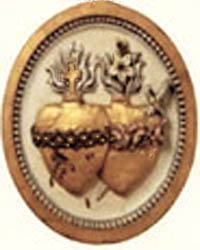+
JMJ
JMJ
And Simeon said to Mary...: Behold this Child is set for the fall, and for the resurrection of many in Israel, and for a sign which shall be contradicted; and thy own soul a sword shall pierce, that, out of many hearts, thoughts may be revealed (Lk. 2.34-36).
It would henceforth be His fate to encounter fanatical opposition from mankind even unto death itself, and this would involve Our Blessed Mother in cruel distress. The Angel had told Her, Benedicta tu in mulieribus ("Blessed art thou amongst women...") and Simeon was now telling Her that in Her blessedness She would be the Mater Dolorosa. One of the penalties of original sin was that a woman should bring forth Her child in sorrow; Simeon was saying that She would continue to live in the sorrow of Her Child. If He was to be the Man of Sorrows, She would be the Mother of Sorrows. An unsuffering Madonna to the suffering Christ would be a loveless Madonna. Since Christ loved mankind so much that He wanted to die to expiate its guilt, then He would also will that His Mother should be wrapped in the swaddling-bands of His own grief.... If He was dedicated to salvation through suffering, so was She. No sooner was this young life launched than Simeon, like an old mariner, talked of shipwreck. No cup of the Father's bitterness had yet to come to the lips of the Babe, and yet a sword was shown to His Mother.
The nearer Christ comes to a heart, the more it becomes conscious of its guilt; it will then either ask for His mercy and find peace, or else it will turn against Him because it is not yet ready to give up its sinfulness. Thus He will separate the good from the bad, the wheat from the chaff. Man's reaction to this Divine Presence will the test: either it will call out all the opposition of egoistic natures, or else it will galvanize them into a regeneration and a resurrection.
Simeon was practically calling Him the 'Divine Disturber', Who would provoke human hearts either to good or evil. Once confronted with Him, they must subscribe either to light or darkness. Before everyone else they can be "broadminded"; but His Presence reveals their hearts to be either fertile ground or hard rock. He cannot come to hearts without clarifying them and dividing them; once in His Presence, a heart discovers both its own thoughts about goodness and its own thoughts about God.
This could never be so if He were just a humanitarian teacher. Simeon knew this well, and he told Our Lord's Mother that Her Son must suffer because His life would be so much opposed to the complacent maxims by which most men govern their lives. He would act on one soul in one way, and on another in another way, as the sun shines on wax and softens it, and shines on mud and hardens it. There is no difference in the sun, only in the objects on which it shines. As the Light of the world, He would be a joy to the good and to the lovers of light; but He would be like a probing searchlight to those who were evil and preferred to live in darkness. The seed is the same, but the soil is different, and each soil will be judged by the way it reacts to the seed. The will of Christ to save is limited by the free reaction of each soul either to accept or to reject. That was what Simeon means by saying: out of many hearts, thoughts shall be revealed (Lk. 2.35).
Our Lord would disclose the true inner dispositions of men. He would test the thoughts of all men who were to encounter Him. Pilate would temporize and then weaken; Herod would mock; Judas would lean to a kind of greedy social security; Nicodemus would sneak in darkness to find the Light; tax collectors would become honest; prostitutes, pure; rich young men would reject His poverty; prodigals would return home; Peter would repent; an Apostle would hang himself. From that day to this, He continues to a sign to be contradicted - a sign of division. It was fitting, therefore, that He should die on a piece of wood in which one bar contradicted the other. The vertical bar of God's will is negated by the horizontal bar of the contradicting human will.
After saying that He was a sign to be contradicted, Simeon turned to the Mother, adding: and thy own soul a sword shall pierce.
She was told that He would be rejected by the world, and with His Crucifixion there would be Her transfixion. As the Child willed the Cross for Himself, so He willed the Sword of Sorrow spared not the Mother. With His Passion there must a Mother of Sorrows! God does not always protect the good from grief. The Father spared not the Son, and the Son spared not the Mother... An unsuffering Christ Who did not freely pay the debt of human guilt would be reduced to the level of an ethical guide; and a mother who did not share in His sufferings would be unworthy of Her great role.
Simeon not only unsheathed a sword; he also told Her where Providence had destined it to be driven. Later on, the Child would say, I came to bring the sword. Simeon told Her that She would feel it in Her heart while Her Son was hanging on the sign of contradiction and She was standing beneath it transfixed in Her grief. The spear that would physically pierce His Heart would mysticall be run into Her own heart. The Divine Child came to die, not to live, for His Name was Savior.


No comments:
Post a Comment